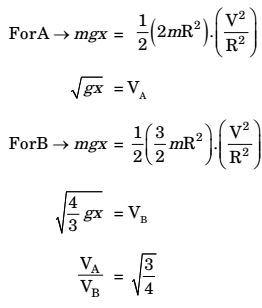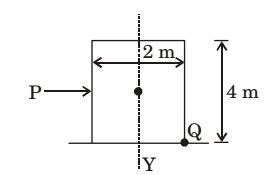Engineering Mechanics Miscellaneous
- Two disc A and B with identical mass (m) and radius (R) are initially at rest. They roll down from the top of identical inclined planes without slipping. Disc A has all of its mass concentrated at the rim, while Disc B has its mass uniformly distributed. At the bottom of the plane, the ratio of velocity of the center of disc A to the velocity of the center of disc B is
-
View Hint View Answer Discuss in Forum
Disc A → I= mR² + mR² = 2mR²
Disc A → I= mR² + mR² = 3 mR² 2 2 
Correct Option: A
Disc A → I= mR² + mR² = 2mR²
Disc A → I= mR² + mR² = 3 mR² 2 2 
- A block mass 10 kg rests on a horizontal floor. The acceleration due to gravity is 9.81 m/s². The coefficient of static friction between the floor and the block is 0.2. A horizontal force of 10 N is applied on the block as shown in the figure. The magnitude of force of friction (in N) on the block is

-
View Hint View Answer Discuss in Forum

Here, μ = 0.2
g = 9.81 m/s²
M = 10 kg
(fs)max = μMg
= 0.2 × 10 × 9.81 = 19.62N
As, (Fs)max > Force applied
So, magnitude of force of friction on block is,
(Fs) = 10NCorrect Option: C

Here, μ = 0.2
g = 9.81 m/s²
M = 10 kg
(fs)max = μMg
= 0.2 × 10 × 9.81 = 19.62N
As, (Fs)max > Force applied
So, magnitude of force of friction on block is,
(Fs) = 10N
- A wardrobe(mass 100 kg, height4m, width 2 m, depth 1 m), symmetric about the Y-Y axis, stands on a rough level floor as shown in the figure. A force P is applied at mid-height on the wardrobe so as to tip it about point Q without slipping. What are the minimum values of the force (in newton) and the static coefficient of friction μ between the floor and the wardrobe, respectively?

-
View Hint View Answer Discuss in Forum
Taking moments about Q, ⅀MQ = 0
⇒ W × 1m = P × 2m⇒ P = 100 × 9.81 = 490.5 N 2
⅀H = 0
⇒ FF = P = 490.5 N
⅀V = 0
⇒ RN = mg = 981 N
Friction Force = μRNμ = 490 = 0.5 981 Correct Option: B
Taking moments about Q, ⅀MQ = 0
⇒ W × 1m = P × 2m⇒ P = 100 × 9.81 = 490.5 N 2
⅀H = 0
⇒ FF = P = 490.5 N
⅀V = 0
⇒ RN = mg = 981 N
Friction Force = μRNμ = 490 = 0.5 981
- A truck accelerates up a 10° incline with a crate of 100 kg. Value of static coefficient of friction between the crate and the truck surface is 0.3. The maximum value of acceleration (in m/s2) of the truck such that the crate does not slide down is ______.
-
View Hint View Answer Discuss in Forum

∑Falong = ma
FF – mg sin θ = ma
⇒ μ mg cos 10 – mg sin 10 = ma
⇒ a = [0.3 cos 10 – sin 10] 9.81 = 1.19.Correct Option: C

∑Falong = ma
FF – mg sin θ = ma
⇒ μ mg cos 10 – mg sin 10 = ma
⇒ a = [0.3 cos 10 – sin 10] 9.81 = 1.19.
- A block weighing 200 N is in contact with a level plane whose coefficients of static and kinetic friction are 0.4 and 0.2, respectively. The block is acted upon by a horizontal force (in newton) P = 10t, where t denotes the time in seconds. The velocity (in m/s) of the block attained after 10 seconds is __________.
-
View Hint View Answer Discuss in Forum
∑Fv = O
N = mg = 200 N
(fs )max = μs N = 0.4 × 200 = 8 0 N
As given in the question, upto 8 sec [P=10 t]→ no motion
⇒ From 8 sec to 10 sec
fK = μKN = 0.2×200 = 40 N
Average applied force is given by,Pang = Pmax + Pmin = 100 + 80 = 90N 2 2
Average Resultant force = Avg. app. force – kinetic friction
= 90 – 40 = 50 N
Average acceleration= 50 × 9.8 200
⇒ V = u + at [∴ u = O]a = 50 × 9.8 200
t = 2 second∴ V = 50 × 9.8 × 2 = 4.9 m/s 200 Correct Option: A
∑Fv = O
N = mg = 200 N
(fs )max = μs N = 0.4 × 200 = 8 0 N
As given in the question, upto 8 sec [P=10 t]→ no motion
⇒ From 8 sec to 10 sec
fK = μKN = 0.2×200 = 40 N
Average applied force is given by,Pang = Pmax + Pmin = 100 + 80 = 90N 2 2
Average Resultant force = Avg. app. force – kinetic friction
= 90 – 40 = 50 N
Average acceleration= 50 × 9.8 200
⇒ V = u + at [∴ u = O]a = 50 × 9.8 200
t = 2 second∴ V = 50 × 9.8 × 2 = 4.9 m/s 200

